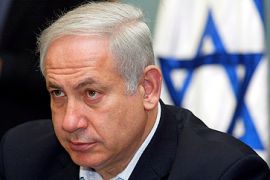Netanyahu on peace
Israel’s prime minister-designate promises to be “partner for peace” with Palestinians.

 |
|
Netanyahu has said his government will be “a partner for peace” for the Palestinians [AFP] |
In a speech the day after he secured the support of the Labor party to form a coalition, Benyamin Netanyahu, Israel’s prime minister-designate, said that peace was a “common and enduring goal for all Israelis and Israeli governments, mine included”.
Below are some of Netanyahu’s quotes about peace in the Middle East throughout his political career.
Asked about Israel’s achievements in its three-week offensive in the Gaza Strip and whether he thought that Hamas should be toppled, Netanyahu said only that “Hamas is incompatible with peace”.
“I hope that the Palestinians in Gaza find the ability to change this regime because we want to have peace with all the Palestinians. Right now, what we should do is enable humanitarian aid to flow into Gaza but not in such a way as it enables Hamas to buy more rockets.” (Haaretz, February 28, 2009)
During a tour of the Golan Heights he said:
“Jerusalem will not be divided and Gamla will not fall again.” (Jerusalem Post, February 8, 2009).
In the run up to Israel’s general election following Israel’s 22-day war on Gaza, Netanyahu told supporters in Beit Aryeh, a small settlement in the West Bank:
“The election on Tuesday will be about one issue – whether this place will remain in our hands or will be handed over to Hamas and Iran.
“We will not withdraw from one inch. Every inch we leave would go to Iran,” referring to the financial and military support that Tehran allegedly gives Hamas. (The Sunday Times, February 8, 2009)
Speaking during the Herzliya Conference, Netanyahu said the government stopped the operation (in Gaza) before the military could halt alleged Hamas arms smuggling through tunnels under the border with Egypt. He also called for removing Hamas from power.
“I want to praise the chief of staff and express my appreciation for the defence minister for his preparation work, and the IDF [Israeli Defence Force] soldiers,” he said, adding, however, that the government “did not allow the military to plug the hole in the south”, referring to the tunnels from Gaza to Egypt. (Herzliya Conference, Israel, February 2009)
“A Likud government will keep Jerusalem united under Israeli sovereignty.” (Reuters, February 3, 2009)
“The next government will have no choice but to finish the work [in Gaza] and remove the Iranian terror base for good.” (Washington Post, February 2, 2009)
Netanyahu called for elections after Ehud Olmert announced he would resign as prime minister of Israel.
“This government has reached an end … it doesn’t matter who heads Kadima. They are all partners in this government’s total failure.” (Israeli radio, July 31, 2008)
Netanyahu resigned from Ariel Sharon’s government in 2005 over Sharon’s plan to withdraw from settlements in the Gaza Strip. He wrote in his resignation letter as finance minister:
“I am not prepared to be a partner to a move which ignores reality, and proceeds blindly toward turning the Gaza Strip into a base for Islamic terrorism which will threaten the state.”
He called the disengagement “an irresponsible step which will endanger Israel’s security, split the people, institute the principle of return to the 1967 borders, and in the future, endanger Jerusalem as well”.
As prime minister from 1996-1999, Netanyahu emphasised a policy of “Three No’s”: no withdrawal from Golan Heights, no discussion of the status of Jerusalem, no negotiations under any preconditions.
As deputy foreign minister in 1989, speaking to students at Tel Aviv’s Bar Ilan University in Israel, he said:
“Israel should have exploited the repression of the demonstrations in China [Tiananmen Square], when world attention focused on that country, to carry out mass expulsions among the Arabs of the territories.” (Israeli Journal Hotam, November 24, 1989)